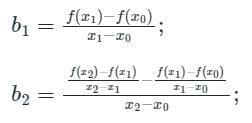Civil Engineering (CE) Exam > Civil Engineering (CE) Questions > If f(0) = 3, f(1) = 5, f(3) = 21, then the un...
Start Learning for Free
If f(0) = 3, f(1) = 5, f(3) = 21, then the unique polynomial of degree 2 or less using Newton divided difference interpolation will be:
- a)2x2 + 2x + 1
- b)2x2 - 3x + 1
- c)2x2 + 3
- d)x2 + 3x - 2
Correct answer is option 'C'. Can you explain this answer?
Most Upvoted Answer
If f(0) = 3, f(1) = 5, f(3) = 21, then the unique polynomial of degree...
Concept:
Newton’s divided difference polynomial method:
Second order polynomial interpolation using Newton’s divided difference polynomial method is as follows,
Given (x0,y0), (x1,y1), (x2,y2) be the data points and f(x) be the quadratic interpolant, then f(x) is given by
f(x) = b0 + b1(x – x0) + b2 (x – x0)(x – x1);
Where
b0 = f(x0);

Calculation:
Given f(0) = 3, f(1) = 5, f(3) = 21;
⇒ (0,3), (1,5), (3,21) are the data points;
The polynomial will be f(x) = b0 + b1(x) + b2 (x)(x – 1);
⇒ b0 = f(0) = 3;

Substituting the constant b0, b1, b2 in the quadratic interpolant,
⇒ f(x) = 3 + 2x + 2 (x)(x – 1) = 3 + 2x + 2x2 – 2x = 3 + 2x2;
The unique polynomial of degree 2 will be f(x) = 3 + 2x2;
Easy method:
To save time, simply substitute the data points in the polynomials given in options and find the polynomial that is satisfying all data points.
Newton’s divided difference polynomial method:
Second order polynomial interpolation using Newton’s divided difference polynomial method is as follows,
Given (x0,y0), (x1,y1), (x2,y2) be the data points and f(x) be the quadratic interpolant, then f(x) is given by
f(x) = b0 + b1(x – x0) + b2 (x – x0)(x – x1);
Where
b0 = f(x0);

Calculation:
Given f(0) = 3, f(1) = 5, f(3) = 21;
⇒ (0,3), (1,5), (3,21) are the data points;
The polynomial will be f(x) = b0 + b1(x) + b2 (x)(x – 1);
⇒ b0 = f(0) = 3;

Substituting the constant b0, b1, b2 in the quadratic interpolant,
⇒ f(x) = 3 + 2x + 2 (x)(x – 1) = 3 + 2x + 2x2 – 2x = 3 + 2x2;
The unique polynomial of degree 2 will be f(x) = 3 + 2x2;
Easy method:
To save time, simply substitute the data points in the polynomials given in options and find the polynomial that is satisfying all data points.
Free Test
| FREE | Start Free Test |
Community Answer
If f(0) = 3, f(1) = 5, f(3) = 21, then the unique polynomial of degree...
Concept:
Newton’s divided difference polynomial method:
Second order polynomial interpolation using Newton’s divided difference polynomial method is as follows,
Given (x0,y0), (x1,y1), (x2,y2) be the data points and f(x) be the quadratic interpolant, then f(x) is given by
f(x) = b0 + b1(x – x0) + b2 (x – x0)(x – x1);
Where
b0 = f(x0);

Calculation:
Given f(0) = 3, f(1) = 5, f(3) = 21;
⇒ (0,3), (1,5), (3,21) are the data points;
The polynomial will be f(x) = b0 + b1(x) + b2 (x)(x – 1);
⇒ b0 = f(0) = 3;

Substituting the constant b0, b1, b2 in the quadratic interpolant,
⇒ f(x) = 3 + 2x + 2 (x)(x – 1) = 3 + 2x + 2x2 – 2x = 3 + 2x2;
The unique polynomial of degree 2 will be f(x) = 3 + 2x2;
Easy method:
To save time, simply substitute the data points in the polynomials given in options and find the polynomial that is satisfying all data points.
Newton’s divided difference polynomial method:
Second order polynomial interpolation using Newton’s divided difference polynomial method is as follows,
Given (x0,y0), (x1,y1), (x2,y2) be the data points and f(x) be the quadratic interpolant, then f(x) is given by
f(x) = b0 + b1(x – x0) + b2 (x – x0)(x – x1);
Where
b0 = f(x0);

Calculation:
Given f(0) = 3, f(1) = 5, f(3) = 21;
⇒ (0,3), (1,5), (3,21) are the data points;
The polynomial will be f(x) = b0 + b1(x) + b2 (x)(x – 1);
⇒ b0 = f(0) = 3;

Substituting the constant b0, b1, b2 in the quadratic interpolant,
⇒ f(x) = 3 + 2x + 2 (x)(x – 1) = 3 + 2x + 2x2 – 2x = 3 + 2x2;
The unique polynomial of degree 2 will be f(x) = 3 + 2x2;
Easy method:
To save time, simply substitute the data points in the polynomials given in options and find the polynomial that is satisfying all data points.

|
Explore Courses for Civil Engineering (CE) exam
|

|
Question Description
If f(0) = 3, f(1) = 5, f(3) = 21, then the unique polynomial of degree 2 or less using Newton divided difference interpolation will be:a)2x2 + 2x + 1b)2x2 - 3x + 1c)2x2 + 3d)x2 + 3x - 2Correct answer is option 'C'. Can you explain this answer? for Civil Engineering (CE) 2025 is part of Civil Engineering (CE) preparation. The Question and answers have been prepared according to the Civil Engineering (CE) exam syllabus. Information about If f(0) = 3, f(1) = 5, f(3) = 21, then the unique polynomial of degree 2 or less using Newton divided difference interpolation will be:a)2x2 + 2x + 1b)2x2 - 3x + 1c)2x2 + 3d)x2 + 3x - 2Correct answer is option 'C'. Can you explain this answer? covers all topics & solutions for Civil Engineering (CE) 2025 Exam. Find important definitions, questions, meanings, examples, exercises and tests below for If f(0) = 3, f(1) = 5, f(3) = 21, then the unique polynomial of degree 2 or less using Newton divided difference interpolation will be:a)2x2 + 2x + 1b)2x2 - 3x + 1c)2x2 + 3d)x2 + 3x - 2Correct answer is option 'C'. Can you explain this answer?.
If f(0) = 3, f(1) = 5, f(3) = 21, then the unique polynomial of degree 2 or less using Newton divided difference interpolation will be:a)2x2 + 2x + 1b)2x2 - 3x + 1c)2x2 + 3d)x2 + 3x - 2Correct answer is option 'C'. Can you explain this answer? for Civil Engineering (CE) 2025 is part of Civil Engineering (CE) preparation. The Question and answers have been prepared according to the Civil Engineering (CE) exam syllabus. Information about If f(0) = 3, f(1) = 5, f(3) = 21, then the unique polynomial of degree 2 or less using Newton divided difference interpolation will be:a)2x2 + 2x + 1b)2x2 - 3x + 1c)2x2 + 3d)x2 + 3x - 2Correct answer is option 'C'. Can you explain this answer? covers all topics & solutions for Civil Engineering (CE) 2025 Exam. Find important definitions, questions, meanings, examples, exercises and tests below for If f(0) = 3, f(1) = 5, f(3) = 21, then the unique polynomial of degree 2 or less using Newton divided difference interpolation will be:a)2x2 + 2x + 1b)2x2 - 3x + 1c)2x2 + 3d)x2 + 3x - 2Correct answer is option 'C'. Can you explain this answer?.
Solutions for If f(0) = 3, f(1) = 5, f(3) = 21, then the unique polynomial of degree 2 or less using Newton divided difference interpolation will be:a)2x2 + 2x + 1b)2x2 - 3x + 1c)2x2 + 3d)x2 + 3x - 2Correct answer is option 'C'. Can you explain this answer? in English & in Hindi are available as part of our courses for Civil Engineering (CE).
Download more important topics, notes, lectures and mock test series for Civil Engineering (CE) Exam by signing up for free.
Here you can find the meaning of If f(0) = 3, f(1) = 5, f(3) = 21, then the unique polynomial of degree 2 or less using Newton divided difference interpolation will be:a)2x2 + 2x + 1b)2x2 - 3x + 1c)2x2 + 3d)x2 + 3x - 2Correct answer is option 'C'. Can you explain this answer? defined & explained in the simplest way possible. Besides giving the explanation of
If f(0) = 3, f(1) = 5, f(3) = 21, then the unique polynomial of degree 2 or less using Newton divided difference interpolation will be:a)2x2 + 2x + 1b)2x2 - 3x + 1c)2x2 + 3d)x2 + 3x - 2Correct answer is option 'C'. Can you explain this answer?, a detailed solution for If f(0) = 3, f(1) = 5, f(3) = 21, then the unique polynomial of degree 2 or less using Newton divided difference interpolation will be:a)2x2 + 2x + 1b)2x2 - 3x + 1c)2x2 + 3d)x2 + 3x - 2Correct answer is option 'C'. Can you explain this answer? has been provided alongside types of If f(0) = 3, f(1) = 5, f(3) = 21, then the unique polynomial of degree 2 or less using Newton divided difference interpolation will be:a)2x2 + 2x + 1b)2x2 - 3x + 1c)2x2 + 3d)x2 + 3x - 2Correct answer is option 'C'. Can you explain this answer? theory, EduRev gives you an
ample number of questions to practice If f(0) = 3, f(1) = 5, f(3) = 21, then the unique polynomial of degree 2 or less using Newton divided difference interpolation will be:a)2x2 + 2x + 1b)2x2 - 3x + 1c)2x2 + 3d)x2 + 3x - 2Correct answer is option 'C'. Can you explain this answer? tests, examples and also practice Civil Engineering (CE) tests.

|
Explore Courses for Civil Engineering (CE) exam
|

|
Signup for Free!
Signup to see your scores go up within 7 days! Learn & Practice with 1000+ FREE Notes, Videos & Tests.























